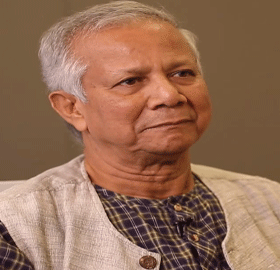
Full Name: Muhammad Yunus
Born: June 28, 1940
Birthplace: Chittagong, Bangladesh
Education: University of Dhaka
Nationality: Bangladeshi
Occupation: Professor, Banker, Economist
Spouse (s): Vera Forostenko, Afrozi Yunus
Children: 2
Height: 5 feet 8 inches
Field: Microcredit theory
Contributions: Grameen Bank
Net Worth: $12 million
Awards: Nobel Peace Prize (2006)
Muhammad Yunus is a Bangladeshi banker, professor, economist, and Nobel Peace Prize, recipient. When he was a professor at the University of Chittagong he developed the concept of microcredit and microfinance. These loans are given especially to poor women for their self-development. He won Nobel Peace Prize as the only Bangladeshi in 2006 for his microcredit concept.
Muhammad Yunus Early Life:
Yunus was born on 28 June 1940 in Hathazari, Chittagong, to Hazi Dula Mia Shoudagar, a jeweler, and his mother Sufia Khatun. He came from a well-known Muslim family in the village of Bathua, by the Boxirhat Road, Chittagong. His family moved to Chittagong, in 1944 and he attended Lamabazar Primary School from his village school. He passed the matriculation examination from Chittagong Collegiate School securing the 16th position among 39,000 students in East Pakistan.
Yunus studied at Chittagong College and in 1957 he enrolled in the department of economics at Dhaka University. He completed a BA in 1960 and MA in 1961. He received a Ph.D. degree in economics from Vanderbilt University in the United States where he was a Fulbright scholarship student.
Early Career:
He started his career as a lecturer in economics at Chittagong College in 1961 and Yunus was an assistant professor of economics at Middle Tennessee State University in Murfreesboro, from 1969 to 1972. Yunus founded a citizen’s committee to raise support for liberation During the Bangladesh Liberation War in 1971. Later he joined Chittagong University as head of the Economics department.
Formation Grameen Bank:
Yunus discovered, during visits to the village of Jobra near Chittagong University, in 1976 that a very small loan could make changed the life of a poor person. Jobra women who made bamboo furniture highly suffered from high-rate loans and their profits would go to the moneylenders. He made his first loan of $27.00 from his own pocket, which was made to 42 women in the Jobra village, who made a net profit of BDT 0.50 (US$0.02) each on the loan.
In December 1976, finally, the government Janata Bank approved his loans to lend to the poor in Jobra village. On 1 October 1983 was renamed the Grameen Bank (Village Bank) and the pilot project began operations as a full-fledged bank to make loans to poor Bangladeshis.
Awards:
Nobel Peace Prize (2006)
Independence Day Award (1987)
World Food Prize (1994)
Franklin D. Roosevelt Freedom Award (2006)
